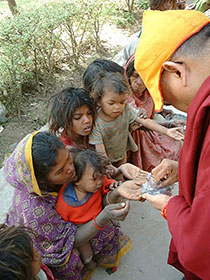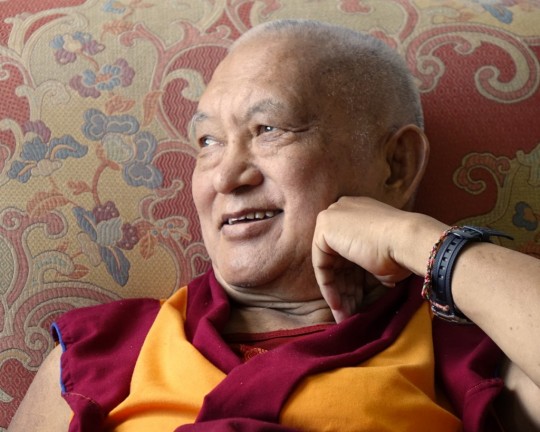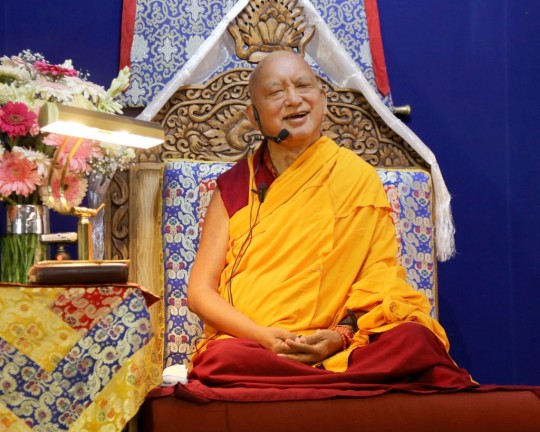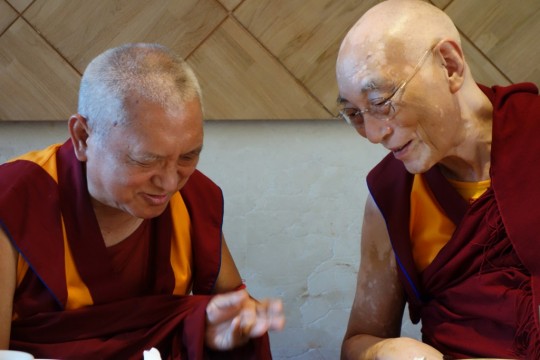- Home
- FPMT Homepage

Foundation for the Preservation of the Mahayana Tradition
The FPMT is an organization devoted to preserving and spreading Mahayana Buddhism worldwide by creating opportunities to listen, reflect, meditate, practice and actualize the unmistaken teachings of the Buddha and based on that experience spreading the Dharma to sentient beings. We provide integrated education through which people’s minds and hearts can be transformed into their highest potential for the benefit of others, inspired by an attitude of universal responsibility and service. We are committed to creating harmonious environments and helping all beings develop their full potential of infinite wisdom and compassion. Our organization is based on the Buddhist tradition of Lama Tsongkhapa of Tibet as taught to us by our founders Lama Thubten Yeshe and Lama Thubten Zopa Rinpoche.
- Willkommen
Die Stiftung zur Erhaltung der Mahayana Tradition (FPMT) ist eine Organisation, die sich weltweit für die Erhaltung und Verbreitung des Mahayana-Buddhismus einsetzt, indem sie Möglichkeiten schafft, den makellosen Lehren des Buddha zuzuhören, über sie zur reflektieren und zu meditieren und auf der Grundlage dieser Erfahrung das Dharma unter den Lebewesen zu verbreiten.
Wir bieten integrierte Schulungswege an, durch denen der Geist und das Herz der Menschen in ihr höchstes Potential verwandelt werden zum Wohl der anderen – inspiriert durch eine Haltung der universellen Verantwortung und dem Wunsch zu dienen. Wir haben uns verpflichtet, harmonische Umgebungen zu schaffen und allen Wesen zu helfen, ihr volles Potenzial unendlicher Weisheit und grenzenlosen Mitgefühls zu verwirklichen.
Unsere Organisation basiert auf der buddhistischen Tradition von Lama Tsongkhapa von Tibet, so wie sie uns von unseren Gründern Lama Thubten Yeshe und Lama Thubten Zopa Rinpoche gelehrt wird.
- Bienvenidos
La Fundación para la preservación de la tradición Mahayana (FPMT) es una organización que se dedica a preservar y difundir el budismo Mahayana en todo el mundo, creando oportunidades para escuchar, reflexionar, meditar, practicar y actualizar las enseñanzas inconfundibles de Buda y en base a esa experiencia difundir el Dharma a los seres.
Proporcionamos una educación integrada a través de la cual las mentes y los corazones de las personas se pueden transformar en su mayor potencial para el beneficio de los demás, inspirados por una actitud de responsabilidad y servicio universales. Estamos comprometidos a crear ambientes armoniosos y ayudar a todos los seres a desarrollar todo su potencial de infinita sabiduría y compasión.
Nuestra organización se basa en la tradición budista de Lama Tsongkhapa del Tíbet como nos lo enseñaron nuestros fundadores Lama Thubten Yeshe y Lama Zopa Rinpoche.
A continuación puede ver una lista de los centros y sus páginas web en su lengua preferida.
- Bienvenue
L’organisation de la FPMT a pour vocation la préservation et la diffusion du bouddhisme du mahayana dans le monde entier. Elle offre l’opportunité d’écouter, de réfléchir, de méditer, de pratiquer et de réaliser les enseignements excellents du Bouddha, pour ensuite transmettre le Dharma à tous les êtres. Nous proposons une formation intégrée grâce à laquelle le cœur et l’esprit de chacun peuvent accomplir leur potentiel le plus élevé pour le bien d’autrui, inspirés par le sens du service et une responsabilité universelle. Nous nous engageons à créer un environnement harmonieux et à aider tous les êtres à épanouir leur potentiel illimité de compassion et de sagesse. Notre organisation s’appuie sur la tradition guéloukpa de Lama Tsongkhapa du Tibet, telle qu’elle a été enseignée par nos fondateurs Lama Thoubtèn Yéshé et Lama Zopa Rinpoché.
Visitez le site de notre Editions Mahayana pour les traductions, conseils et nouvelles du Bureau international en français.
Voici une liste de centres et de leurs sites dans votre langue préférée
- Benvenuto
L’FPMT è un organizzazione il cui scopo è preservare e diffondere il Buddhismo Mahayana nel mondo, creando occasioni di ascolto, riflessione, meditazione e pratica dei perfetti insegnamenti del Buddha, al fine di attualizzare e diffondere il Dharma fra tutti gli esseri senzienti.
Offriamo un’educazione integrata, che può trasformare la mente e i cuori delle persone nel loro massimo potenziale, per il beneficio di tutti gli esseri, ispirati da un’attitudine di responsabilità universale e di servizio.
Il nostro obiettivo è quello di creare contesti armoniosi e aiutare tutti gli esseri a sviluppare in modo completo le proprie potenzialità di infinita saggezza e compassione.
La nostra organizzazione si basa sulla tradizione buddhista di Lama Tsongkhapa del Tibet, così come ci è stata insegnata dai nostri fondatori Lama Thubten Yeshe e Lama Zopa Rinpoche.
Di seguito potete trovare un elenco dei centri e dei loro siti nella lingua da voi prescelta.
- 欢迎 / 歡迎
简体中文
“护持大乘法脉基金会”( 英文简称:FPMT。全名:Foundation for the Preservation of the Mahayana Tradition) 是一个致力于护持和弘扬大乘佛法的国际佛教组织。我们提供听闻,思维,禅修,修行和实证佛陀无误教法的机会,以便让一切众生都能够享受佛法的指引和滋润。
我们全力创造和谐融洽的环境, 为人们提供解行并重的完整佛法教育,以便启发内在的环宇悲心及责任心,并开发内心所蕴藏的巨大潜能 — 无限的智慧与悲心 — 以便利益和服务一切有情。
FPMT的创办人是图腾耶喜喇嘛和喇嘛梭巴仁波切。我们所修习的是由两位上师所教导的,西藏喀巴大师的佛法传承。
繁體中文
護持大乘法脈基金會”( 英文簡稱:FPMT。全名:Found
ation for the Preservation of the Mahayana Tradition ) 是一個致力於護持和弘揚大乘佛法的國際佛教組織。我們提供聽聞, 思維,禪修,修行和實證佛陀無誤教法的機會,以便讓一切眾生都能 夠享受佛法的指引和滋潤。 我們全力創造和諧融洽的環境,
為人們提供解行並重的完整佛法教育,以便啟發內在的環宇悲心及責 任心,並開發內心所蘊藏的巨大潛能 — 無限的智慧與悲心 – – 以便利益和服務一切有情。 FPMT的創辦人是圖騰耶喜喇嘛和喇嘛梭巴仁波切。
我們所修習的是由兩位上師所教導的,西藏喀巴大師的佛法傳承。 察看道场信息:
- FPMT Homepage
- News/Media
-
- Study & Practice
-
-
- About FPMT Education Services
- Latest News
- Programs
- New to Buddhism?
- Buddhist Mind Science: Activating Your Potential
- Heart Advice for Death and Dying
- Discovering Buddhism
- Living in the Path
- Exploring Buddhism
- FPMT Basic Program
- FPMT Masters Program
- FPMT In-Depth Meditation Training
- Maitripa College
- Lotsawa Rinchen Zangpo Translator Program
- Universal Education for Compassion & Wisdom
- Online Learning Center
-
- Prayers & Practice Materials
- Overview of Prayers & Practices
- Full Catalogue of Prayers & Practice Materials
- Explore Popular Topics
- Benefiting Animals
- Chenrezig Resources
- Death & Dying Resources
- Lama Chopa (Guru Puja)
- Lama Zopa Rinpoche: Compendium of Precious Instructions
- Lama Zopa Rinpoche: Life Practice Advice
- Lama Zopa Rinpoche Practice Series
- Lamrim Resources
- Mantras
- Prayer Book Updates
- Purification Practices
- Sutras
- Thought Transformation (Lojong)
- Audio Materials
- Dharma Dates - Tibetan Calendar
- Translation Services
- Publishing Services
- Ways to Offer Support
- Prayers & Practice Materials
-
- Teachings and Advice
- Find Teachings and Advice
- Lama Zopa Rinpoche Advice Page
- Lama Zopa Rinpoche: Compendium of Precious Instructions
- Lama Zopa Rinpoche Video Teachings
- ༧སྐྱབས་རྗེ་བཟོད་པ་རིན་པོ་ཆེ་མཆོག་ནས་སྩལ་བའི་བཀའ་སློབ་བརྙན་འཕྲིན།
- Podcasts
- Lama Yeshe Wisdom Archive
- Buddhism FAQ
- Dharma for Young People
- Resources on Holy Objects
- Teachings and Advice
-
-
*If a menu item has a submenu clicking once will expand the menu clicking twice will open the page.
-
-
- Centers
-
- Teachers
-
- Projects
-
-
-
-
*If a menu item has a submenu clicking once will expand the menu clicking twice will open the page.
-
-
- FPMT
-
-
-
-
-
Over and over again our experiences prove that it is our mental outlook that is fundamentally responsible for whether we are successful or unsuccessful, healthy or ill, attractive or ugly, happy or depressed.
Lama Thubten Yeshe
-
-
-
- Shop
-
-
-
The Foundation Store is FPMT’s online shop and features a vast selection of Buddhist study and practice materials written or recommended by our lineage gurus. These items include homestudy programs, prayers and practices in PDF or eBook format, materials for children, and other resources to support practitioners.
Items displayed in the shop are made available for Dharma practice and educational purposes, and never for the purpose of profiting from their sale. Please read FPMT Foundation Store Policy Regarding Dharma Items for more information.
-
-
Lama Zopa Rinpoche News
25
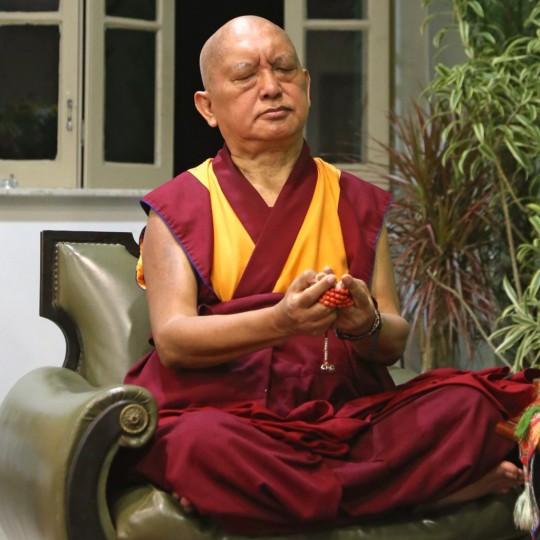
Lama Zopa Rinpoche offering a mandala during tsog puja, Rio de Janeiro, Brazil, September 2015. Photo by Ven. Roger Kunsang.
“The very highest meaning of tsog is to join method and wisdom,” Lama Zopa Rinpoche said about the tsog ceremony in the advice “Tsog Offering Practice” on the Lama Yeshe Wisdom Archive. “The real meaning of experiencing tsog is the transcendental wisdom, non-dual great bliss – the wisdom of emptiness, the non-duality of that, and uniting these two. That is the very essence of tsog. It is the offering of that experience, oneself experiencing it, the male and female heroes and heroines, of which the essence is the guru deity, and oneself also experiencing that, as the guru deity. The real meaning of tsog is integrating method and wisdom, the transcendental wisdom, non-dual bliss and voidness (this is the secret meaning).
“The need for the actual tsog substances is to develop the very heart of the Mahayana and tantric path, that brings enlightenment in one brief lifetime of these degenerate times, because it ceases the defilements quickly, including the actual negative imprints left on the mental continuum by the delusions, and is the quickest way to collect extensive merit, which takes three countless great eons on the paramita path to collect to achieve enlightenment. Here, in a brief lifetime of these degenerate times, using the transcendental wisdom of non-dual bliss and voidness to increase this, one needs to enjoy these tsog substances.
“This is the principal method of the circle of tsog, to gain general attainments, and it is the principal method to restore samaya, tantric vows, pacify obstacles, and is the main cause for achieving Heruka and Vajrayogini’s pure land – Tharpo Kachoe (Pure Sky Enjoyment). This is the principal cause to be born there. Therefore, one should practice offering tsog. …”
You can read the more extensive commentary by Rinpoche in “Tsog Offering Practice” on the Lama Yeshe Wisdom Archive: https://www.lamayeshe.com/advice/tsog-offering-practice/.
Lama Zopa Rinpoche is the spiritual director of the Foundation for the Preservation of Mahayana Tradition (FPMT), a Tibetan Buddhist organization dedicated to the transmission of the Mahayana Buddhist tradition and values worldwide through teaching, meditation and community service.
- Tagged: lama yeshe wisdom archive, lama zopa rinpoche, tsog
- 0
24
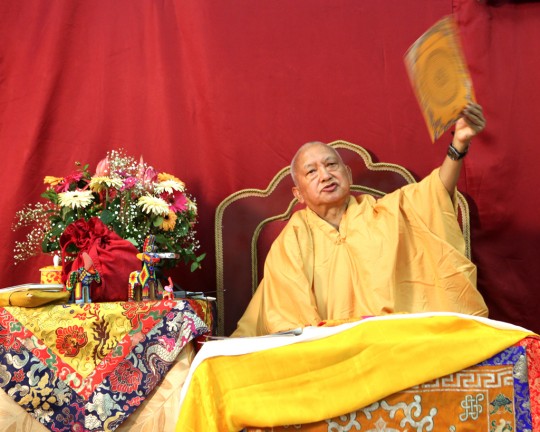
Lama Zopa Rinpoche at the end of the weekend lam-rim retreat in Colombia, September 2015. Photo by Ven. Lobsang Sherab. Rinpoche is wearing a traditional Colombian-style teaching robe offered to him by students.
Lama Zopa Rinpoche arrived in Brazil earlier this week after concluding a weekend lam-rim retreat in Colombia, organized by Centro Yamantaka.
Rinpoche will be teaching in Rio de Janeiro, Brazil, giving a public talk on September 25 and leading a lam-rim retreat September 26-27. Both events are being organized by Centro Shiwa Lha. For details on the event, visit http://www.lamazopabrasil.org/.
You can watch a live webcast of the teachings at the links below.
Public talk “Compassion in a Hostile World,” September 25, 7:30-9:30 p.m. local time (UTC-3), in English:
http://livestream.com/FPMT/BR2015
Public talk “Compassion in a Hostile World,” September 25, 7:30-9:30 p.m. local time (UTC-3), in Portuguese (organized by Centro Shiwa Lha):
https://www.youtube.com/watch?v=A2qjsaD9mM0
Lam-rim Retreat, September 26-27, in English:
http://livestream.com/FPMT/BR2015
Lam-rim Retreat, September 26-27, in Portuguese (organized by Centro Shiwa Lha):
https://www.youtube.com/watch?v=My6x-eOxDMU
High quality video recordings of Rinpoche’s teachings in Colombia and Brazil will be made available as quickly as possible on FPMT’s Rinpoche Available Now page.
Learn more about Lama Zopa Rinpoche, spiritual director of the Foundation for the Preservation of Mahayana Tradition (FPMT), and Rinpoche’s vision for a better world. Sign up to receive news and updates.
- Tagged: centro shiwa lha, centro yamantaka, lama zopa rinpoche
- 0
23
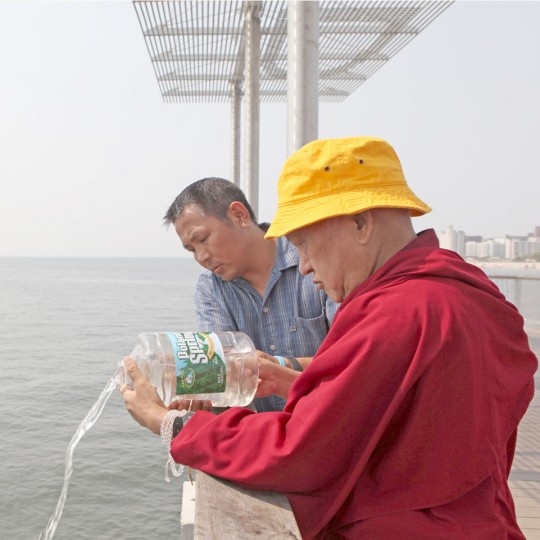
Lama Zopa Rinpoche blessing the Atlantic Ocean and all the creatures in it. A Sherpa ex-monk who has climbed Mount Everest five times assists Rinpoche, New York, US, September 2015. Photo by Ven. Losang Sherab. Rinpoche recited many mani mantras and blessed the bottles of water, which he then poured into the bay.
“The meditation on bodhichitta that you said you are doing is the best practice, that makes you achieve all the realizations and attain enlightenment in the quickest way,” Lama Zopa Rinpoche wrote to a student who had written to thank Rinpoche for bringing him so much happiness through his publications. “It is also the quickest way to free the sentient beings from the oceans of samsaric suffering and bring them to full enlightenment. Especially if you are doing the practice of bodhichitta with tong-len – taking numberless sentient beings’ suffering and the causes of suffering into your heart, onto yourself, and destroying the self-cherishing thought as well as the ignorance, the root of your samsara, the oceans of suffering of samsara. The real I, which is the false I, which is like a dream, like a hallucination, an illusion – like thinking the reflection of your face in the mirror or on the ocean is a real face – that is destroyed, that is realized to be empty, as it is empty. So you can do a short meditation on emptiness like this. Meditate on shunyata, emptiness only.
“When you take the sufferings of others, do so with compassion. When you dedicate to others, your body is in the form of numberless wish-granting jewels and all sentient beings receive whatever they want from that, and they achieve the dharmakaya and rupakaya. Dedicate all your enjoyments and all your belongings to the numberless six realm sentient beings, so they receive everything they want and achieve the dharmakaya and rupakaya. Then you dedicate all your past, present and future merits and their results, as well as all the good things in this life and in your next rebirth. Dedicate all the enjoyments in good rebirths from life to life, then the everlasting happiness of nirvana, and next, the ultimate happiness, the peerless happiness, the total cessation of all the obscurations and completion of all the realizations. So you dedicate all of this to numberless hell beings, numberless hungry ghosts, numberless animals, numberless human beings, numberless asuras, numberless suras and numberless intermediate state beings. And from that they achieve everything, the dharmakaya and rupakaya.
“When you take the suffering and its causes – wow, wow, wow, wow, wow, wow – this is the most powerful purification. Negative karmas and obscurations collected from beginningless rebirths are purified. It is most amazing, most amazing, most amazing, most amazing, most amazing! …”
Read the rest of Rinpoche’s letter with advice on tong-len practice on the Lama Yeshe Wisdom Archive: https://www.lamayeshe.com/advice/tong-len-practice.
Lama Zopa Rinpoche is the spiritual director of the Foundation for the Preservation of Mahayana Tradition (FPMT), a Tibetan Buddhist organization dedicated to the transmission of the Mahayana Buddhist tradition and values worldwide through teaching, meditation and community service.
- Tagged: lama yeshe wisdom archive, lama zopa rinpoche, tong-len
- 0
22
“I think the most important thing is that you’re happy. Not just in the Western way, feeling happy with excitement and attachment, but inner happiness,” Lama Zopa Rinpoche said in May 2015. “I’m talking about the happiness that you can develop from life to life, up to enlightenment. This happiness can be completed; it is so meaningful. Whatever you do in the world, this is the essence. This happiness is Dharma; it is happiness which can be continued and developed.”
You can read more from Lama Zopa Rinpoche on inner happiness and making life meaningful on the Lama Yeshe Wisdom Archive (https://www.lamayeshe.com/).
Learn more about Lama Zopa Rinpoche, spiritual director of the Foundation for the Preservation of Mahayana Tradition (FPMT), and Rinpoche’s vision for a better world. Sign up to receive news and updates. Visit https://fpmt.org/.
21
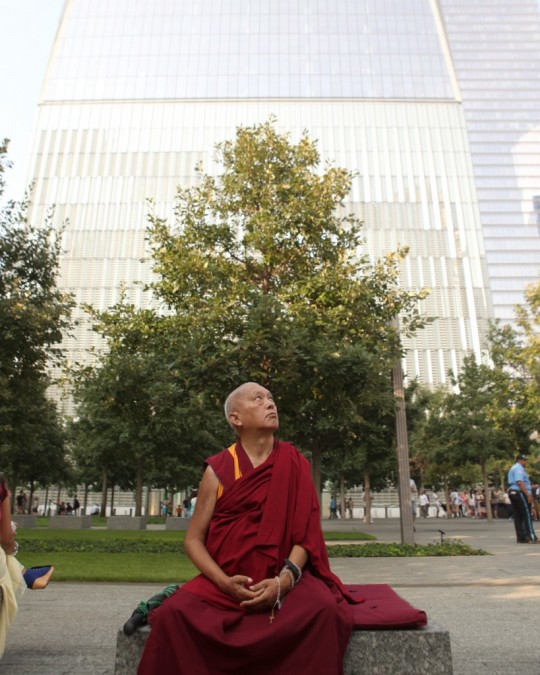
Lama Zopa Rinpoche at the 9/11 Memorial in New York City, US, September 2015. Photo by Ven. Lobsang Sherab.
“As explained by the fully enlightened being, Shakyamuni Buddha, from his own experience, by meditating on the reality or ultimate nature of the I, the five aggregates, the twelve doors of the senses, the eighteen elements and other phenomena, and actualizing the wisdom understanding the very nature of these things, this is the main weapon, like an atomic bomb, to destroy the very root of all problems,” Lama Zopa Rinpoche taught in Florence, Italy, in 1990, as published by the Lama Yeshe Wisdom Archive.
“Without the wisdom directly realizing the ultimate nature or emptiness of the I, aggregates and all the rest of the phenomena, there is no way to eliminate the root of all our problems. There is no way to eliminate the sufferings of birth, old age, sickness and death, or the worry and fear of meeting undesirable objects and separating from desirable ones. The root of all these difficulties we go through in our life cannot be eliminated without wisdom. No matter what other realizations we have, whether of tantra or even bodhichitta, until we are able to actualize the wisdom realizing the ultimate nature of the I and so forth, the root of the whole problem cannot be eliminated. Only by having this wisdom can we eliminate the root of the entire samsaric suffering.
“Without achieving this wisdom realizing emptiness, no matter what other realization we have, there is no way we can end the suffering of samsara, no way to reach the end of the entire problem, which means no way to achieve liberation. Once we achieve liberation, it is impossible to experience suffering again. The root of the entire problem is the ignorance not knowing the ultimate nature of the I and aggregates. No other realization can directly eradicate this ignorance – only wisdom. Therefore, listening, reflecting and meditating on the ultimate nature of everything is the most important thing.
“To think about emptiness for even one second is very fortunate. Going beyond hallucination and touching the ultimate nature for even one second is great purification. So many heavy negative karmas are purified just by that. A sutra mentions that even questioning whether there is such a thing as emptiness or not shatters samsara into pieces. This expresses how powerful meditation on the ultimate nature of things is.
“The teachings also say that simply generating the wish to experience the Middle Way view of emptiness purifies many heavy negative karmas, such as the ten non-virtues and even the five uninterrupted negative karmas, which are the heaviest among all the negative actions. The five are killing your present-life father or mother, causing blood to flow from a tathagata or a buddha, killing an arhat, and causing disunity among the Sangha. These negative karmas are called ‘uninterrupted’ because immediately after death one is born in hell, without any other rebirth intervening. So, even this very heavy negative karma can be purified by generating the wish to understand the ultimate nature or shunyata. …”
You can read the entire teaching “Actualizing the Wisdom Realizing Emptiness” at this link: https://www.lamayeshe.com/article/meditation-emptiness-and-tong-len-taking-and-giving.
More information, photos and updates about FPMT spiritual director Lama Zopa Rinpoche can be found on Rinpoche’s webpage. If you’d like to receive news of Lama Zopa Rinpoche and FPMT via email, sign up to FPMT News.
18
Lama Zopa Rinpoche’s teachings in Colombia during September 18-20 will be webcast live.
On Friday, September 18, Rinpoche gives a public talk on “Pacifying Inner and External Chaos” in Bogotá, Colombia. The talk is scheduled to begin at 7 p.m. local time (UTC-5).
On September 19-20, Rinpoche will give teachings during a weekend lam-rim retreat. Teachings are scheduled for 4 p.m. and 7:30 p.m. local time.
You can watch Rinpoche teach in Colombia on FPMT’s Livestream page:
https://livestream.com/FPMT/COL2015
Centro Yamantaka, the FPMT center organizing these events, made special arrangements to have high-speed internet at the retreat location so that the teachings can be webcast live and watched by students internationally.
For updates on teaching times and to watch the live webcast, visit the above link. You can also sign up for webcast updates from Livestream by clicking the the green “Follow” button on the Livestream page.
After the event, high quality video recordings of the teachings will be made available as quickly as possible on FPMT’s Rinpoche Available Now page.
Learn more about Lama Zopa Rinpoche, spiritual director of the Foundation for the Preservation of Mahayana Tradition (FPMT), and Rinpoche’s vision for a better world. Sign up to receive news and updates.
- Tagged: centro yamantaka, colombia, lama zopa rinpoche, webcast
- 0
17
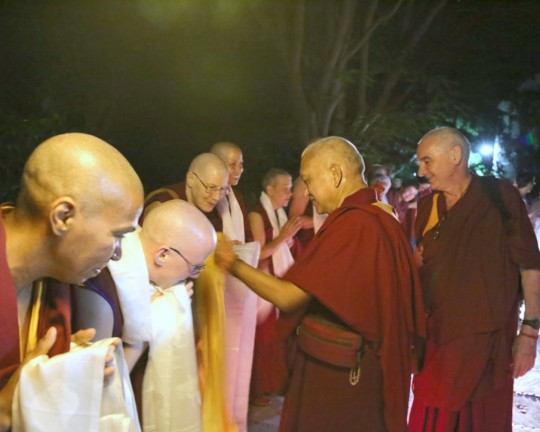
Lama Zopa Rinpoche arriving at the retreat in Guadalajara, Mexico, September 2015. Photo by Ven. Lobsang Sherab.
“What differentiates Buddhism from other religions is COMPASSION for every single sentient being.” — Lama Zopa Rinpoche from “Compassion is of the Upmost Need”
More information, photos and updates about FPMT spiritual director Lama Zopa Rinpoche can be found on Rinpoche’s webpage. If you’d like to receive news of Lama Zopa Rinpoche and FPMT via email, sign up to FPMT News.
- Tagged: compassion
- 0
16
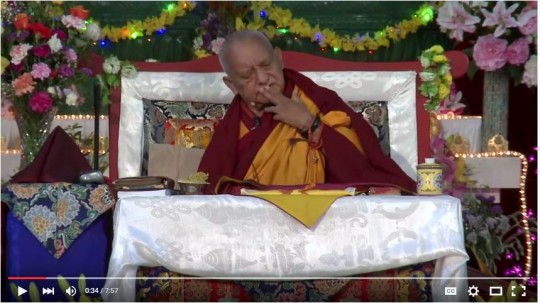
Screenshot from “Smoking Harms Your Virtuous Thoughts”
“Even when people died and someone asked Panchen Losang Chokyi to do phowa, he asked whether the person had smoked or not,” Lama Zopa Rinpoche mentions in a new video on FPMT’s YouTube channel. “If the person had smoked, then he didn’t do phowa; phowa doesn’t work. But if the person wasn’t smoking, then phowa works.
“… Anyway, it is not good, it harms like that, you or anybody. When you’re depressed, then you smoke, even if you are not smoking when you’re happy. But some people do that when they are overly happy, excited, then they smoke. Or if somebody is depressed, then they smoke. They put one cigarette there, one cigarette there, one cigarette there, then double, double down below, so one box is finished within one hour, I’m not sure, four boxes in a day or something.
“So I’m just telling you this: if you want to develop virtuous thoughts, positive thoughts, virtuous thoughts, and then finish negative thoughts, which cause suffering to you and to the world, to the sentient beings, which cause suffering to sentient beings, to the numberless sentient beings, and especially if you want to get help at death time, then don’t smoke. Otherwise if you get depressed, you are depressed, then you smoke; you do everything because you are depressed. That is the way to find pleasure, the way you think, but that is a very limited way to kind of look for pleasure.”
Watch “Smoking Harms Your Virtuous Thoughts” on YouTube:
https://www.youtube.com/watch?v=9a3YgDu7lko
You can watch more video clips of Lama Zopa Rinpoche on FPMT’s YouTube page: http://bit.ly/fpmt-youtube
For longer videos of Rinpoche teaching, visit: http://bit.ly/rinpoche-available-now
Learn more about Lama Zopa Rinpoche, spiritual director of the Foundation for the Preservation of Mahayana Tradition (FPMT), and Rinpoche’s vision for a better world. Sign up to receive news and updates.
- Tagged: lama zopa rinpoche, smoking, video, youtube
- 0
15
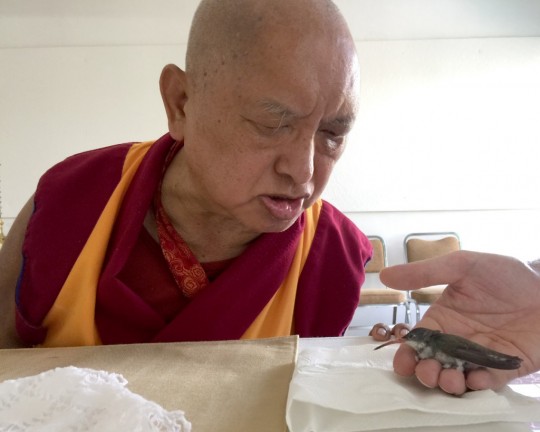
Lama Zopa Rinpoche blessing an injured hummingbird, which after a little while flew away, Mexico, September 2015. Photo by Ven. Roger Kunsang.
On September 13, Ven. Roger Kunsang shared on his Twitter page this brief teaching from Lama Zopa Rinpoche:
Lama Zopa; the king of delusions, thinking our false “I” is real! We need to practice the good heart for happiness.
You can find teachings and advice from Lama Zopa Rinpoche on happiness and a meaningful life by visiting the Lama Yeshe Wisdom Archive.
Ven. Roger Kunsang, Lama Zopa Rinpoche’s assistant and CEO of FPMT Inc., shares Lama Zopa Rinpoche’s recent pith sayings on Ven. Roger’s Twitter page. (You can also read them on Ven. Roger’s Facebook page.)
More information, photos and updates about FPMT spiritual director Lama Zopa Rinpoche can be found on Rinpoche’s webpage. If you’d like to receive news of Lama Zopa Rinpoche via email, sign up to receive FPMT News.
- Tagged: happiness, lama zopa rinpoche, twitter
- 0
14
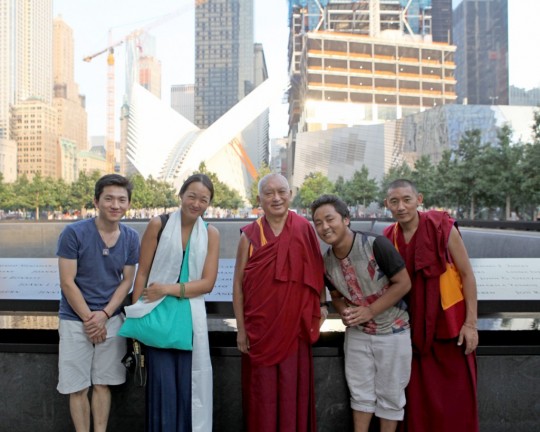
Lama Zopa Rinpoche with Ven. Sangpo Sherpa; Jennifer Kim, director of Shantideva Meditation Center; and two students at the National September 11 Memorial in New York City after doing prayers for all those who died during the World Trade Center attacks in 2001, New York, US, September 2015. Photo by Ven. Lobsang Sherab.
From visiting and doing prayers at the memorial for the victims of the September 11 attacks, to teaching at Tibet House, to receiving rare oral transmissions, to spending time with the former monks and nuns of Kopan, to engaging in many other beneficial activities, Lama Zopa Rinpoche had a full month in August 2015 when he visited New York City. Jennifer Kim, director of Shantideva Meditation Center in New York, wrote Mandala about Rinpoche’s recent visit.
With immense kindness, Lama Zopa Rinpoche offered teachings to the students of Shantideva Meditation Center during the last week of August while he manifested in New York City.
During this impromptu set of teachings at Tibet House, where he was greeted by Prof. Robert Thurman, who serves as president of Tibet House, Rinpoche touched upon many aspects of the path to enlightenment. He spoke of the rarity of our precious human rebirth by comparing our existence to numberless beings consumed by immense suffering and perpetual fear, and he spoke of an opportunity to transform our lives “from kaka to gold” by practicing Dharma.
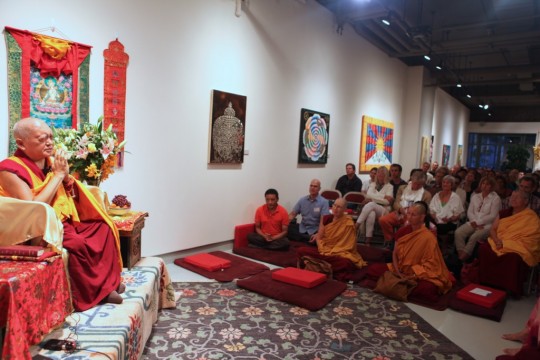
Lama Zopa Rinpoche teaching at Tibet House, New York, US, August 2015. Photo by Ven. Lobsang Sherab.
Rinpoche taught, “To waste this opportunity to practice would be like to carry medicine but never take it.” He shared that our human existence is often taken for granted as if it were tissue paper; at the end of the day, we need to leave everything behind, with the consciousness departing like hair being pulled from butter.
As a remedy to this suffering state, Rinpoche spoke of the three scopes of the path, with the essence being non-harm for the lower and middling scopes, and the essence being compassion for the greater scope. Bodhichitta, he said, was more valuable than skies of wish-fulfilling jewels, and even if we had only had five minutes to live, the best thing would be to practice bodhichitta.
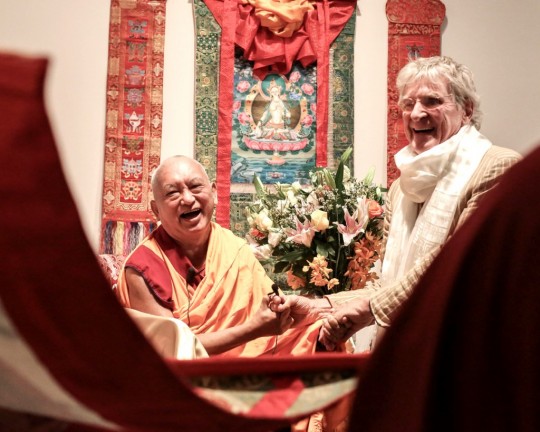
Lama Zopa Rinpoche with Prof. Robert Thurman viewing a Green Tara thangka offered by Shantideva Meditation Center to Tibet House, New York, August 2015. Photo by Edward Sczudlo.
Lama Zopa Rinpoche also spoke extensively on patience, since one is not able to benefit others if one is harming them. He taught that when receiving harm, we had created the cause to allow this to happen, like an arrow hitting a target. The more fruitful alternative than returning harm would be to generate compassion, as our negativity would be exhausted while perpetrators would be set up for extensive suffering if they did not practice purification.
Rinpoche also offered teachings about emptiness and its subtler views as a remedy to our “piles of hallucinations.” Rinpoche spoke of the immense benefits of reciting texts such as the Heart Sutra and Vajra Cutter Sutra, even to animals; if the meaning were not understood now, seeds would be planted in the mind for future realization.
Watch video of Lama Zopa Rinpoche teaching in New York City
Rinpoche also offered several transmissions, including that for the mantra of Shakyamuni Buddha, the “35 Confession Buddhas with 7 Medicine Buddhas” practice, and the “Praises to the 21 Taras.” These were in addition to a Guru Puja and prayers for the victims of 9/11, as Rinpoche had wished to make these prayers a long time ago. Rinpoche mentioned, “Prayers are very powerful!”
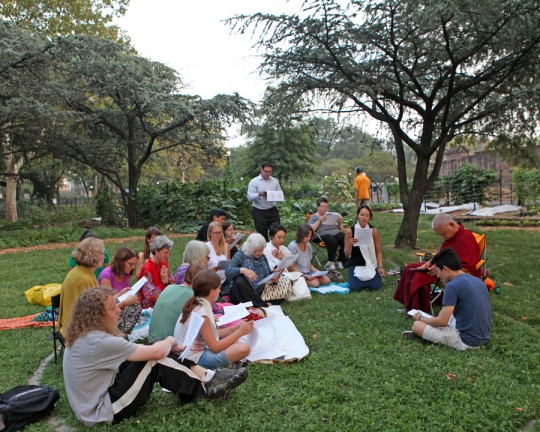
Lama Zopa Rinpoche leading students in prayer for the 9/11 tragedy at the Labyrinth, New York City, US, September 2015. Photo By Ven. Losang Sherab. Rinpoche and students recited “King of Prayers” and Lama Tsongkhapa’s “Prayer for the Beginning, Middle and End.”
Students also received the opportunity to connect with Rinpoche during a long life initiation hosted by the ex-monks and ex-nuns of Kopan Monastery, and to bid him farewell from the city.
Many students expressed their profound gratitude for these experiences. One student spoke vibrantly about Rinpoche’s laughter, while another mentioned that her question was answered during his first moments of speaking. Older students were awed by Rinpoche’s vibrant energy, especially after his stroke in 2011, and several mentioned that his prostrations before the teachings brought tears to their eyes. Now, this precious dream has finished, and we are left to plant seeds for our enlightenment and make strong prayers for Rinpoche’s quick return.
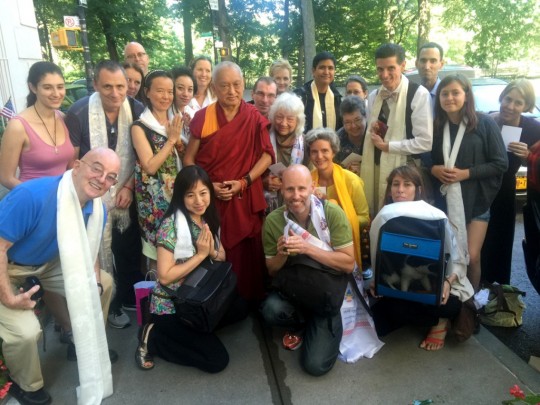
Lama Zopa Rinpoche being seen off In New York City by Shantideva Meditation Center students before his departure for Mexico, September 2015. Photo by Ven. Roger Kunsang.
FPMT.org brings you news of Lama Zopa Rinpoche and of activities, teachings and events from nearly 160 FPMT centers, projects and services around the globe. If you like what you read here, consider becoming a Friend of FPMT, which supports our work. Video of Rinpoche’s recent teachings can be found on FPMT’s “Rinpoche Available Now.”
12
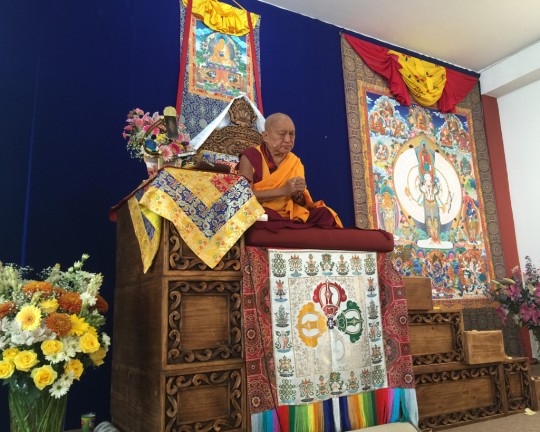
Lama Zopa Rinpoche doing Lama Chopa tsog during retreat in Mexico, September 2015. Photo by Ven. Roger Kunsang.
On the morning of September 11, Lama Zopa Rinpoche began the day leading the participants of the “Essence of Nectar” retreat in Mexico in Lama Chöpa with tsog. Ven. Steve Carlier served as umze, or chant leader, for the puja, which continued into the afternoon and evening sessions with breaks for lunch and dinner. Rinpoche made this change to the retreat schedule after receiving news that His Eminence Choden Rinpoche had manifested the appearance of passing away. Choden Rinpoche had taught at many FPMT centers over the past 15 years and many FPMT students, including students at the retreat, have receive teachings and initiations from him.
Lama Zopa Rinpoche emphasized the importance of the tsog offering as a way of purifying negative karma created in relation to the guru. Rinpoche said Lama Chöpa tsog is especially powerful if it can be performed on the same day as the guru’s passing.
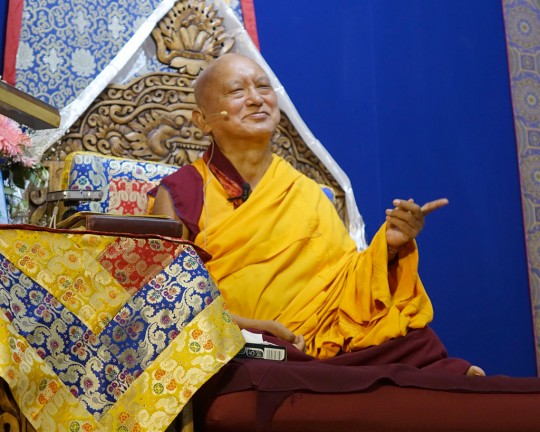
Lama Zopa Rinpoche teaching at the “Essence of Nectar” retreat, Mexico, September 2015. Photo by Ven. Roger Kunsang.
“Your mind creates happiness and suffering in dependence on the way you think,” Lama Zopa Rinpoche said during an earlier teaching at the “Essence of Nectar” retreat. The root text for the retreat is Essence of Nectar, a poem written by Yeshe Tsondru, a nineteenth-century Gelug lama from Sera Me Monastery. Essence of Nectar is a lam-rim, or stages on the path, text.
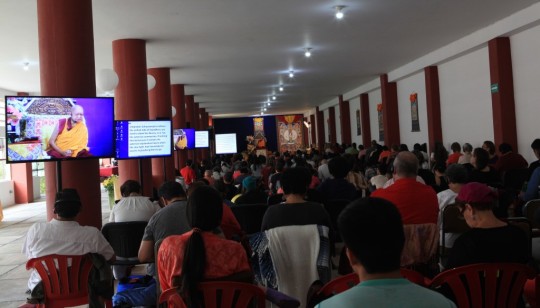
A view from the back of the room of Rinpoche teaching in Mexico, September 2015. Photo by Ven. Lobsang Sherab.
About 300 people are attending the retreat, which runs September 5-12. The event is taking place at a retreat center outside of Guadalajara, Mexico. FPMT Mexico is hosting and organizing the retreat with Khamlungpa Center, which is located in Guadalajara, doing the logistical organization.
“When you have the thought of kindness, that people are most kind, dear and precious, then naturally respect comes. Then you create no harm. The thought of anger and the jealous mind stop. Pride stops naturally,” Rinpoche taught during the evening session on September 10.
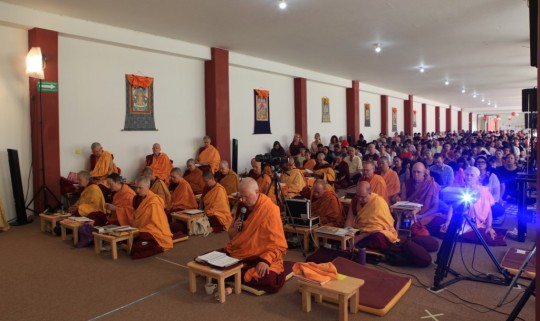
Retreat participants at the “Essence of Nectar” retreat, Guadalajara, Mexico, September 2015. Photo by Ven. Lobsang Sherab.
Video recordings of Rinpoche teaching at the “Essence of Nectar” retreat will be made available as soon as possible on FPMT.org’s “Rinpoche Available Now” page. You can find video and rough transcripts from Rinpoche’s recent teaching events in Denmark, the Netherlands, Russia, Australia, New Zealand and more. For some events, video is also available with French and Spanish translation.
Lama Zopa Rinpoche is the spiritual director of the Foundation for the Preservation of Mahayana Tradition (FPMT), a Tibetan Buddhist organization dedicated to the transmission of the Mahayana Buddhist tradition and values worldwide through teaching, meditation and community service.
11
Lama Zopa Rinpoche offered Lama Chöpa tsog early Friday morning in Mexico, where he is leading retreat, after hearing the news that His Eminence Choden Rinpoche showed the aspect of passing away. Lama Zopa Rinpoche mentioned that others could do this practice themselves or at their Dharma centers, especially if they had a Dharma connection with Choden Rinpoche.
Before showing the aspect of passing away, Choden Rinpoche himself advised a collection of prayers for his students to offer at this time.
You may also read a detailed description of the event of Choden Rinpoche’s transition, provided by Ven. Tenzin Namdak, who is the primary English language contact for the Choden Rinpoche Committee at Sera Je Monastery. [Rebeca Cuan Corral provided a Spanish language translation of event of Choden Rinpoche’s transition.] You may also read a transcript of His Holiness the Dalai Lama’s meeting with Choden Rinpoche on August 29, 2015, translated by Ven. Tenzin Gache of Sera IMI House as Sera Je Monastery. [Rebeca Cuan Corral’s Spanish language translation of the meeting.]
See “The Life of a Hidden Meditator: Choden Rinpoche” from Mandala July 2000 to read more about Choden Rinpoche’s experiences in Tibet at Sera Monastery and in Lhasa after 1959. The complete multi-part feature “The Life of a Hidden Meditator” is available as a PDF. You can also read more recent stories about Choden Rinpoche on FPMT.org.
More information, photos and updates about FPMT spiritual director Lama Zopa Rinpoche can be found on Rinpoche’s webpage. If you’d like to receive news of Lama Zopa Rinpoche and FPMT via email, sign up to FPMT News.
- Tagged: choden rinpoche, lama zopa rinpoche
- 0
- Home
- News/Media
- Study & Practice
- About FPMT Education Services
- Latest News
- Programs
- New to Buddhism?
- Buddhist Mind Science: Activating Your Potential
- Heart Advice for Death and Dying
- Discovering Buddhism
- Living in the Path
- Exploring Buddhism
- FPMT Basic Program
- FPMT Masters Program
- FPMT In-Depth Meditation Training
- Maitripa College
- Lotsawa Rinchen Zangpo Translator Program
- Universal Education for Compassion & Wisdom
- Online Learning Center
- Prayers & Practice Materials
- Overview of Prayers & Practices
- Full Catalogue of Prayers & Practice Materials
- Explore Popular Topics
- Benefiting Animals
- Chenrezig Resources
- Death & Dying Resources
- Lama Chopa (Guru Puja)
- Lama Zopa Rinpoche: Compendium of Precious Instructions
- Lama Zopa Rinpoche: Life Practice Advice
- Lama Zopa Rinpoche Practice Series
- Lamrim Resources
- Mantras
- Prayer Book Updates
- Purification Practices
- Sutras
- Thought Transformation (Lojong)
- Audio Materials
- Dharma Dates – Tibetan Calendar
- Translation Services
- Publishing Services
- Teachings and Advice
- Find Teachings and Advice
- Lama Zopa Rinpoche Advice Page
- Lama Zopa Rinpoche: Compendium of Precious Instructions
- Lama Zopa Rinpoche Video Teachings
- ༧སྐྱབས་རྗེ་བཟོད་པ་རིན་པོ་ཆེ་མཆོག་ནས་སྩལ་བའི་བཀའ་སློབ་བརྙན་འཕྲིན།
- Podcasts
- Lama Yeshe Wisdom Archive
- Buddhism FAQ
- Dharma for Young People
- Resources on Holy Objects
- Ways to Offer Support
- Centers
- Affiliates Area
- Teachers
- Projects
- Charitable Projects
- Make a Donation
- Applying for Grants
- News about Projects
- Other Projects within FPMT
- Support International Office
- Projects Photo Galleries
- Give Where Most Needed
- FPMT
- Shop
Translate*
*powered by Google TranslateTranslation of pages on fpmt.org is performed by Google Translate, a third party service which FPMT has no control over. The service provides automated computer translations that are only an approximation of the websites' original content. The translations should not be considered exact and only used as a rough guide.The root of your life’s problems becomes non-existent when you cherish others.






